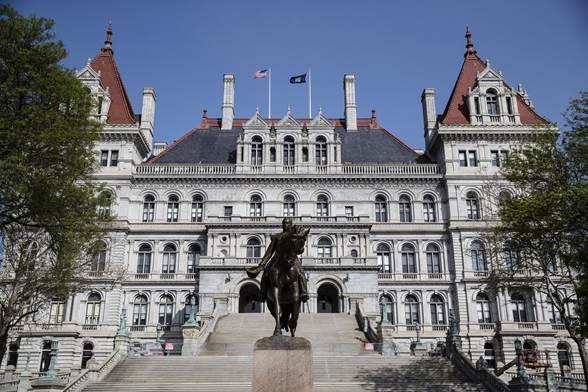Alcohol and ice cream is not a new phenomenon in New York. Since 2018, Gilligan’s Ice Cream in Sherburne, New York, has been adding beer and hard cider to its ice cream, with flavors such as Fireball Whiskey. Tipsy Scoop opened at 270 Metropolitan Avenue in Brooklyn in September 2019. They boast of blending “the magic of an artisanal, hand crafted ice cream with the mastery of a perfectly mixed cocktail.” Flavors include Cake Batter Vodka Martini and Vanilla Bean Bourbon. Other establishments, such as Morgenstern’s on West Houston Street, UES on Second Avenue, Oddfellows on Water Street in DUMBO, and Bona Bona in Port Chester all are licensed to serve alcohol on their premises. The New York State Liquor Authority, since at least January 2019, has not considered a confectionary with 5% or less alcohol content an alcoholic beverage. There is a bill that unanimously just passed the New York State Senate (S7013) amending a number of statutes to make this state law. This would apply to sealed packages of ice cream, as well as ice cream products sold in restaurants or ice cream shops. The bill is awaiting action by the New York State Assembly.
Donald Bernstein, of Bernstein Redo, P.C., will be moderating a panel at the Bar Association of the City of New York on January 22, 2020 at 9 a.m. on “Opening a Restaurant in New York City; Legal Issues Bootcamp.” This continuing legal education course, sponsored by the Hospitality Committee of the City Bar Association, will feature four speakers. Topics include corporate issues, drafting and negotiating a restaurant lease, labor and employment issues particular to restaurants, and a segment on retail liquor licenses which will be covered by Mr. Bernstein. It is a four hour course offering four CLE credits to attorneys. Registration is through the City Bar Association.
Two significant changes in New York’s liquor laws have been proposed by Governor Andrew Cuomo in his 2020 State of the State message. The first relates to the tied house rule, a post-Prohibition law that prohibits anyone having any interest in a liquor manufacturer or wholesaler from having an interest in a retail liquor license. This rule is an absolute prohibition under current law, and even a de minimus interest is unlawful. Under the new proposal, the rule would only apply if the retailer is “wholly owned” by the manufacturer or wholesaler. This would not disqualify an investor from having a tied-house interest if the retailer is not wholly owned by the manufacturer or retailer. The second proposed change is to license motion picture theaters. Under current law, a movie theater can only serve alcoholic beverages if it meets the definition of a restaurant, that is serving full meals out of a kitchen in the charge of a chef. The current proposal would impose some restrictions, but would remove the restaurant requirement. We will be tracking these proposals to see if they become law.
In July of last year this site included a post discussing the issue of third party providers, such as e-commerce and internet platforms that facilitate the purchase of alcoholic beverages at restaurants or package stores. The issue presented was whether such third party providers, or TPP’s, were considered trafficking in the sale of alcoholic beverages under New York law such that they would be required to obtain a license. Our July 2018 post noted a number of rulings made by the New York State Liquor Authority on the issue, which some commentators argued were inconsistent. On August 12, 2019, the SLA issued a draft Advisory #2019-x addressing this issue. The proposed Advisory would allow TPP’s to be paid a flat fee for its services, or to be paid 10% or less of the licensee’s profits, without requiring the TPP to be licensed. If a TPP is receiving more than 10% of the licensee’s profits, or exercised some level of control over the licensee’s business, then it would have to be licensed, or it would be considered illegally availing itself of someone else’s license. This proposed Advisory would apply to management companies, landlords, delivery services, website hosts, and some other third parties. The SLA is inviting comments from the public and the industry before it finalizes this Advisory.
There are some hot issues and topics in the world of liquor licensing in New York. We featured one of those issues, licensing private members clubs which have become increasingly popular, in our May 24, 2018 post. Two other models that are emerging are shared workspaces and retail dry good stores. Traditionally, retail stores, including department stores, may have a restaurant or cafe tucked somewhere inside, but they typically do not sell or serve liquor outside of that defined and limited space. There is a trend now to do away with that barrier and license the entire multi-level store. This would allow customers to roam the store with a glass of wine, or to have private events with food and beverages in any part of the store. This model can be seen for example in the new RH Gallery on Ninth Avenue in the Meatpacking District where the entire five story building is licensed, and in the new three story Neiman-Marcus in Hudson Yards. On the other hand, there is opposition to Bloomingdale’s application to license its entire store at 504 Broadway in SoHo. The neighbors and local community board are pushing back, fearful that opening that door would then allow a host of other stores on Broadway, such as Urban Outfitters or Nike, to serve alcohol as well. Not long ago, the State Liquor Authority refused to license a two story venue that had a restaurant on the ground floor and spa in the cellar, determining that a spa is not a proper venue for a liquor license.
Another venue that does not traditionally have a food and beverage component, shared workspaces such as We Work, have also been looking to obtain liquor licenses as an amenity to its tenants. Some legal issues have so far stymied licensing some of those spaces, particularly those shared workspaces where separate offices are leased out to members. On the other hand, the Wing, shared workspace designed for women is licensed at their SoHo and Dumbo locations. Those locations, however, unlike the WeWork model, do not assign specific offices to tenants. How the State Liquor Authority deals with licensing full retail stores and shared workspaces will be developing and we will be watching. Stay tuned.
The New York state legislature passed a bill last month that could have a significant effect on restaurant, bar and hotel owners. The bill, if signed by the governor, would allow a business and personal lien to be placed on owners, managers and some investors of a business based solely on an allegation of a wage violation. The bill applies to claims of non-payment of wages under federal as well as New York law, including claims relating to improperly taken tip credits, withheld gratuities, overtime, uniform maintenance pay, and other categories. An employee making a covered claim can obtain a lien, similar to a mechanic’s lien that is filed by contractors, and can do so prior to proving his or her claim and even though the employee was paid in full. This new law has sweeping effects, and was opposed by the New York City Hospitality Alliance. The Hospitality Alliance encouraged restaurant, hotel and bar owners to contact their representatives in Albany to fight this legislation. Though some amendments were made to the bill before it passed, it was nonetheless, according to the Hospitality Alliance, “a very unwelcome outcome.” If signed by the governor, it will become law 30 days thereafter.
On May 17, 2019 the Hospitality Committee of the Bar Association of the City of New York will be sponsoring a continuing legal education class on opening a restaurant. The program will focus on corporate, leasing, liquor license and employment/labor issues. Bernstein Redo, P.C.’s Donald Bernstein will be one of the presenters, speaking on issues relating to restaurant leases. Topics will include use provisions, default and assignment provisions, lease contingencies including liquor license approvals, issues relating to noise, garbage and odors, good guy guaranties, and other important issues. A total of 4 CLE credits will be given for the program which begins at 9:00 am at the offices of the City Bar at 42 West 44th Street.
On March 19, 2019, the New York County Lawyers’ Association will sponsor a two-hour continuing legal education class on issues on restaurant law at its offices at 14 Vesey Street beginning at 6 pm. Bernstein Redo, P.C.’s Donald Bernstein will teach a segment on retail liquor licenses, joined by Nancy Schess, Esq. who will speak on labor and employment issues for restaurants, and Kyle-Beth Hilfer, Esq. who will present on intellectual property issues. The course is sponsored by the Real Property Section of the Association and will be moderated by its chair, Roy Fenichel of MIT National Land Services. Registration is through www.nycla.org.
Last week a court in Manhattan reversed the denial by the New York City Council of a sidewalk café permit for Calle Dao at 461 West 23rd Street in Chelsea. Calle Dao, a Cuban-Chinese restaurant in the London Terrace building, had applied for a permit for a small sidewalk café. The last restaurant in that space, Barchetta, had been issued a sidewalk café permit when it had operated in 2014. However, opposition by some vocal residents of London Terrace, Community Board 4, and City Council Speaker Corey Johnson led to a vote in the Council to deny the permit, even though it had been approved by the Department of Consumer Affairs. In her ruling, Judge Carol R. Edmead said that the Council’s vote was “unsupported by evidence regarding land use and zoning regulations and only based on community opposition.” Citing previous court rulings, the judge ruled that the Council’s decision to deny the permit to Calle Dao “fails the rational basis test and is thus arbitrary and capricious.” The City was ordered to give its consent to the café. Bernstein Redo, P.C. was part of the Calle Dao team.
On February 13, 2019, Bernstein Redo, P.C.’s Donald Bernstein will be co-presenting with Robin Zeidel, Esq. of Zeidel & Associates, P.C., a webcast seminar on Drafting and Negotiating Restaurant Leases. This one hour continuing legal education program is sponsored by the American Law Institute. Drafting and negotiating the varied clauses contained in restaurant leases presents a unique set of challenges involving complex issues not found in other retail agreements. The interplay between these critical provisions will not only set the standard for a successful landlord-tenant relationship, but also avoid costly problems down the road. Regardless of whether you represent a landlord or tenant, you need to be able to identify the most problematic lease sections, which will be covered in this seminar. Registration is through the American Law Institute website, www.ali-cle.org.









